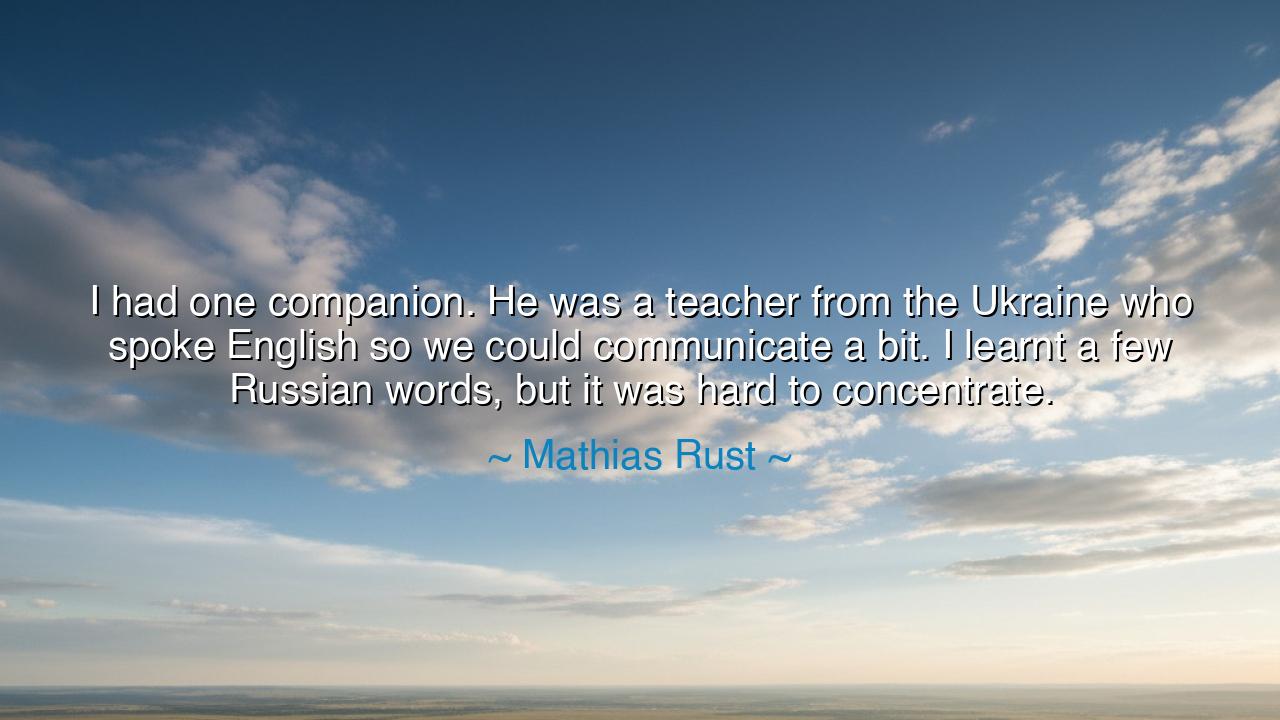
I had one companion. He was a teacher from the Ukraine who spoke
I had one companion. He was a teacher from the Ukraine who spoke English so we could communicate a bit. I learnt a few Russian words, but it was hard to concentrate.






Hear the words of Mathias Rust, the young German who once dared to land his small plane in Red Square and shook the world with a gesture of peace: “I had one companion. He was a teacher from the Ukraine who spoke English so we could communicate a bit. I learnt a few Russian words, but it was hard to concentrate.” In this memory, drawn from the days of his captivity in the Soviet Union, shines a quiet but profound truth: that even in the midst of isolation, fear, and uncertainty, the human soul finds solace in companionship, and that the bridge of language, however fragile, can ease the weight of solitude.
Rust, surrounded by strangeness, cut off from the familiar, found in one teacher a lifeline. The man was not a soldier, nor a judge, nor a fellow prisoner of his fate, but a humble teacher—one who carried within him the gift of words and the patience to share them. Through him, Rust could speak, however imperfectly, and be heard. In the wilderness of silence, such a connection is no small thing. It is a reminder that humanity, more than politics or power, is sustained by bonds of communication, by the miracle of one voice reaching another.
History bears many witnesses to this truth. Recall the story of Viktor Frankl, the psychiatrist who endured the hell of the concentration camps. Amid the suffering, what gave strength was not bread alone, but the fellowship of shared words, the encouragement of a companion, the reminder that even in despair, meaning could be spoken and received. Or think of prisoners of war, who, deprived of liberty, carved messages on walls or whispered through cracks—any chance to preserve the lifeline of connection. Rust’s encounter with a Ukrainian teacher stands in this same stream: that a few words, a shared tongue, can guard the spirit against despair.
Yet there is another lesson in Rust’s words: how difficult it is to learn when the mind is burdened. He speaks of trying to absorb Russian words, yet finding it hard to concentrate. This, too, is wisdom. The mind under stress struggles to expand, for it is consumed by survival. And yet even in this, he tried. The effort to learn, however small, becomes an act of resilience. To grasp a new word in the language of one’s captors is to reclaim a measure of power, to reach beyond fear toward understanding.
The teacher, then, becomes more than a man—he is a symbol of continuity, of learning in the midst of chaos. That he was Ukrainian, bridging Rust’s German with Russian through English, is itself a symbol: nations may be divided, but individuals may connect. In one room, across the barriers of empire and captivity, a student and a teacher found common ground in language. And that small ground was enough to remind Rust that he was not utterly alone.
What lesson must we take, O seekers? It is this: never underestimate the power of companionship, even in its smallest form. A single person who listens, a single teacher who shares words, can anchor a soul adrift in strangeness. And never despise the effort to learn, even when circumstances press hard. Each word, each attempt, is a step toward freedom, a proof that the spirit has not yielded.
Therefore, let us live as both students and teachers. When you encounter one in need, offer the gift of communication, however simple. When you yourself are lost, reach for connection, however fragile. For in the darkest places, it is not power or wealth that saves the heart, but the humble exchange of words, the presence of a companion, and the eternal truth that humanity endures wherever two souls can still speak to one another. In teaching and in learning, even in captivity, we remain free.






AAdministratorAdministrator
Welcome, honored guests. Please leave a comment, we will respond soon